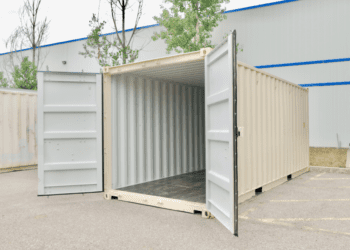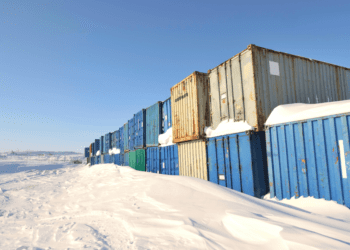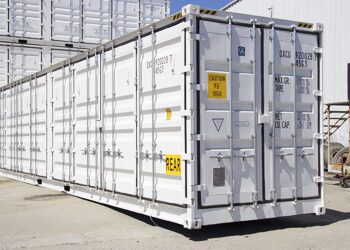Shipping containers are built to withstand extreme environments and are typically used for many years to transport goods, for storage, and for numerous other uses. Since they are made of industrial-grade steel, shipping container rust can occur. Luckily, you can do several things to treat and prevent container rust from occurring. In this blog, discover the issues rust can cause, what can cause a container to rust, and some rust prevention tips and treatments. With a bit of maintenance, you can ensure your container is safe to use and in good working condition for many years to come.
Preventing rust on shipping containers is essential because rust can weaken the container’s structural integrity, making it less able to withstand the rigours of shipping and handling. Additionally, rust also leads to leaks and other damage, which can compromise the contents of the container and lead to financial loss for the owner or operator of the container. Since rust can cause the metal to become brittle and can lead to more rust and corrosion. This then leads to leaks and issues, and the container’s functionality is impacted.
When you prevent rusting, it helps ensure that the container remains in good condition for a more extended period of time. Also, depending on how you use the container, rust can make a container look unsightly and less professional. Keeping a container rust-free not only helps maintain its appearance but also ensures that it remains structurally sound and good to use.
In short, rust can make the container less safe and able to fulfill its intended purpose. This leads to financial losses. For example, if you plan to sell or rent your container, preventing rust can help increase its value and reduce the costs of repairing or replacing a rusty container. In addition, if you can minimize container rust and quickly treat or manage any new rust on your shipping container, you will decrease the need for expensive repairs or replacements.
Although many shipping containers are designed to be wind and watertight (WWT) and to withstand harsh environments, they are not 100% immune to rusting through their many years of use. Understanding what can cause containers to rust helps owners be protective and manage surface-level rust before it worsens, eventually leading to severe damage.
Here are some common reasons why shipping containers rust:
Overall, a combination of moisture and oxygen in contact with steel, the oxide that forms is called rust.
As you can imagine, some industries, environments, and uses for shipping containers create ideal conditions for rusting. For example, shipping containers are often used to transport goods by sea. This is why they are often referred to as sea cans within the industry. However, their exposure to saltwater and the humid marine environment can accelerate the rusting process.
Similarly, when they are used as storage containers or as structures, the outdoors and weather make them vulnerable to rusting. For example, shipping containers can store tools, machinery, and other materials on construction sites and farms. In addition, they are also used as storage facilities, offices, and accommodations in mining sites and a diverse range of other types of work sites.
It is important to remember that even if a container is used in a non-coastal area or indoors, it can still rust due to condensation, dust, humidity and temperature changes.
In both cases, regular inspections and maintenance are vital in preventing rust. Whether you buy a new shipping container or a used shipping container, preventing rust involves many of the same techniques. However, there are some different factors to consider:
New containers are also called one-trip containers since it is common for new containers to have travelled from their manufacturer to a container sales company’s yard or location. This means that the new container may have some very minor dents, scratches, or a little surface rust due to transportation. New shipping containers are typically made from a type of steel that is resistant to rust. However, when you buy new containers, it is crucial to keep them dry and well-ventilated. In addition, you might want to consider using a rust inhibitor or paint to provide additional protection.
Older containers are more likely to have rust, so if you have had a container for many years, its condition is most likely similar to a used container for sale. Meaning it may have already been exposed to rust-causing elements such as saltwater or moisture. When buying a used container or inspecting older containers, it is vital to check and treat any rust as soon as possible.
No matter the age, type, size, and condition of your shipping container, there are several universal ways to prevent rust. Also, if you find rust, do not panic. Remember that with time and use, it is inevitable for rust to occur. When this happens, treating it quickly and effectively slows the shipping container rusting process. Here are some easy and affordable ways you can be proactive in preventing and treating rust on your shipping container:
Keeping the container dry and well-ventilated is one of the most effective ways to prevent rust from forming. Store the container in a covered and dry location. Make sure that any water that gets into the container is drained immediately. Stopping shipping condensation is one of the best ways to keep the contents and container safe, rust-free, and dry.
Rust inhibitors are chemical compounds that can be applied to the surface of the container to create a barrier that prevents rust from forming. There are many different types of rust inhibitors available, including oil-based and water-based formulas. Some rust-inhibiting paints are specially formulated to provide a barrier between the metal and the elements, preventing rust from forming.
A shipping container cover is an excellent way to protect the container from the elements and help prevent rust from forming. Different types of container covers are available, including fitted covers that are custom-made to fit a specific container and universal covers which are great for any regular container.
Regularly inspecting the container and performing necessary repairs or maintenance can help prevent rust from forming and spreading. This can include patching any holes or cracks, cleaning and painting the container, and ensuring that all the seals and gaskets are in good condition.
Use a wire brush or sandpaper to remove as much rust as possible. This will help ensure that the rust inhibitor or paint you use will adhere properly.
Applying rust converters to any rust that has already formed converts it into a stable compound that will not continue to rust. Rust converters are excellent for treating small areas of rust and are often primer before painting the container.
Try to determine the cause of the rust, such as a leak or a crack. Fixing the underlying problem can help prevent further rust from forming. Also, checking for, keeping an eye on, and repairing any dents, scratches, and other potential damages helps maintain a shipping container.
Many companies and individuals trust shipping containers to safely store, transport and protect their contents. In addition, business owners and families often convert containers into homes, sheds, pop-up shops, offices, and garages. These affordable, durable, customizable, and long-lasting shipping containers have endless creative uses and benefits.
If you own a container, it is essential to be aware of the issues that rust can cause and what can contribute to your shipping container developing rust. By following some simple tips for preventing and treating rust, you can ensure your shipping container remains safe and in good condition for many years.
Are you in the market for a shipping container? Coast Containers has a diverse range of new and used shipping containers for sale in Canada. If you have any questions, would like to get a custom quote or want to know if we can accommodate your specific needs, please give us a call or visit our Coast Containers website to contact us online. We are happy to help!




